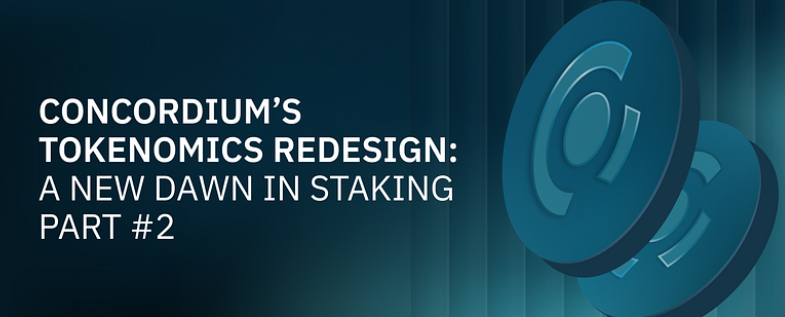The Concordium blockchain is undergoing a significant redesign in its tokenomics model to increase its appeal and attract a broader spectrum of Web3 players. In the previous article (Part 1) of this ongoing series of tokenomics changes, we delved into the new consensus ConcordiumBFT as one of the cornerstones underpinning this redesign.
Now, we will focus on laying out the penalties and cool-downs for dishonest and faulty behavior. This is motivated by security and efficiency reasons while simultaneously aligning us with industry standards as Concordium gears up to become one of the biggest players in Web3.
Penalties and Cool-Downs
The changes
Stake in cool-down
Currently, a validator or delegator that removes stake sees this stake frozen for a few weeks before it is available in their wallet. This guarantees a certain stability for the stake and pools, since it prevents stakers from staking and unstaking regularly to take part in daily trading. But while stake is in cool-down, it still counts as effective stake in the pool, meaning that it counts towards the lottery power of the pool and earns rewards for the pool and the corresponding staker.
However, the latter point is not standard in the industry, since it allows a dishonest party to time an attack for just before the stake is available, allowing them to move it straight after the attack and avoiding consequences for their behavior. With the new changes, Concordium will line up to the prevailing industry norms and not count the stake in cool-down as part of the effective stake of a pool any longer.
Essentially, this means that no more rewards will be earned for stake in cool-down. Thereby resulting in a heightened security level of the chain as this stake cannot be used for an attack any longer.
Cool-down length
The cool-down lengths are currently 3 weeks for validators and 2 weeks for delegators. In order to simplify the tokenomics and prevent validators from delegating to themselves to reduce the cool-down time, we are setting the cool-down to 3 weeks for all forms of staking, i.e., both validators and delegators. Combined with the first measure announced above, this increases the security by making sure that all stake goes through a 3 week cool-down where it is not effective.
Note that delegators can change the pool to which they delegate without going through any cool-down.
Removing inactive validators
Concordium is a science-based blockchain. This means — among other things — that there are written security proofs for all its protocols. For example, we can prove that if ⅔ of the validators are honest (weighted by stake), the safety of the ConcordiumBFT protocol cannot be violated, and if we additionally assume reasonable network conditions, the chain will always be live.
In conjunction with these security proofs, it is also important to have measures to incite validators to continue running (honestly). Validators cannot attack the chain by producing or signing conflicting blocks as long as less than ⅓ are cooperating in this attack. However, such an attack results in extra work for the honest validators and can make adding new blocks slower. Similarly, if a validator stops running correctly — because they forget to update their software or don’t attend to their node — the system can still work as long as less than ⅓ are doing this. But this causes timeouts and slows block production as well. Ideally, these issues should not take place at all to keep things running smoothly.
Penalties for inactive and faulty validators will gradually be introduced on the blockchain, thus lining Concordium up with industry best practices. While there is no sign of any attempts at attacking the chain, we unfortunately already have multiple inactive validators.
ConcordiumBFT makes it visible when a validator is elected leader but fails to produce a block. So the first measure that will be introduced is to ban validators that regularly fail to produce blocks when it is their turn — which will also remove all inactive validators.
The criteria details for removal as a validator are still to be settled. Nonetheless, the effects of being removed are to be in cool-down for 3 weeks — during which no rewards are earned and preventing the validator from registering again until the cool-down is over — and losing all their delegators — who get automatically moved to passive delegation.
Timeline
Changing the cool-down for delegators is a simple parameter update, which will happen near the end of Q4 along with all the parameter changes announced in the first article. Banning faulty validators and removing the stake in cool-down from the effective stake of a node require protocol updates, and will be done in 2024 when the next protocol updates occur.
Summary
Concordium’s tokenomics redesign is a game-changing move that aims to enhance user engagement while ensuring the protocol’s long-term viability and appeal in the Web3 ecosystem. Altogether, the penalties and cool-downs explained in this article, coupled with ConcordiumBFT will improve the security of the chain while simultaneously boosting the efficiency of validators and guarantee that everything operates seamlessly.
 English
English
 Deutsch
Deutsch
 Español
Español
 Français
Français
 Português
Português
 日本
日本
 한국인
한국인
 Türkçe
Türkçe
 Русский
Русский
 Tiếng Việt
Tiếng Việt














